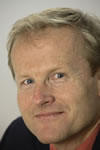WHERE IS GERMANY HEADING? THE SEPTEMBER 27TH ELECTIONS
 Mark Cassell - Associate Professor of Political Science at Kent State University |
Friday September 25, 2009
12:30-1:30 p.m.
Crawford Hall - Room 9
Inamori Center
Case Western Reserve University
Dear Colleagues,
This coming Sunday, German voters will go to the polls for one of the nation’s least predictable, and perhaps most significant, elections. Since 2005 Germany has been governed by a “grand coalition” of the Christian Democratic Union party with the Social Democratic Party. This coalition has prevented the CDU from pursuing some of Chancellor Angela Merkel’s preferred policies, but satisfied few SDP constituencies. So dissatisfied voters have been moving towards the three smaller parties: the market-oriented Free Democratic Party, the Green Party, and the “Left,” a mix of former Communists and disaffected SDP members.
Polls show the CDU/FDP coalition between them at just below half of the vote, with about five percent undecided. But the SDP is campaigning against the “threat” of a market-favoring government. ”It would be a gross irony of history,” the head of Germany’s largest union proclaims, “if those who profit from the financial crisis were the ones who wanted more, not less, shareholder-value capitalism.”
As usual, we will gather in Room 9 of the Inamori International Center for Ethics and Excellence, on the lower level of Crawford Hall, for free cookies, beverages, and brown bag lunch.
Best regards,
Joe White
About Our Guests
Mark Cassell is Associate Professor of Political Science at Kent State University where he teaches courses in comparative public administration, comparative public policy, and urban politics. He holds a Ph.D., MPA, and MA in Political Science from the University of Wisconsin – Madison.
His scholarship is mainly concerned with understanding public sector transformations cross-nationally.
His book, How Governments Privatize: The Politics of Divestment in the United States and Germany (Georgetown University Press, 2003) received the 2003 Charles H. Levine Award for the best book in public policy and administration. It compares the bureaucratic experiences of two unique public agencies: Germany’s Treuhandanstalt, charged with privatizing the industrial firms of the former East Germany in the aftermath of the fall of the Berlin Wall; and the United States’ Resolution Trust Corporation, an agency charged with transferring to the private sector the assets taken over by the federal government in the wake of the savings and loan crisis. More recently, Cassell has done research on the adoption of new technologies by governments in Germany and the United States including publishing several pieces on the adoption and implementation of open source technology by government in Germany and Austria. Other work has appeared in Public Administration Review, International Public Management Journal, Social Science Quarterly, and Governance: An International Journal of Policy. He currently has a book forthcoming from SUNY Press (with Susan M. Hoffmann) on mission expansion in the Federal Home Loan Bank System.
Professor Cassell was born in Frankfurt Germany and spent much of his childhood with his grandfather, a long time county executive and member of the German parliament. In 1993, Cassell attended the Philips University in Marburg for one year. He also worked for a year as a researcher at the Social Science Research Center in Berlin, Germany – a highly respected interdisciplinary think tank similar to the Brookings Institution. In 2007, Cassell worked in Geneva, Switzerland for six months managing an undergraduate program in international relations. He has received grants from the Social Science Research Council, the Fulbright Association, and the Friedrich Ebert Foundation.
REVISED Friday Lunch Upcoming Topics and Speakers:
October 2: Burning River Reborn? The State of the Cuyahoga. With Michael Scott, The Cleveland Plain Dealer
October 9: ***Special Location - Clark Hall Room 206, the Baker-Nord Center Seminar Room*** Bush, Barack, and the Meltdown. With Kathryn C. Lavelle, Ellen and Dixon Long Associate Professor of World Affairs. Room to be determined
October 16: Virtue, Vice, and Contraband: The History of Contraception in America. With James M. Edmonson, Curator, Dittrick Medical History Center and Museum
October 23: Reforming Cuyahoga County Government. Speakers TBA
October 30: The University’s “Internationalization” Initiative. With David Fleshler, Associate Provost for International Affairs
November 6: Unhealthy Claims
About “Healthy” Foods. With Hope Barkoukis, Associate Professor of
Nutrition
November 13: What Should the Common Reading for New Students Do?
With Mano Singham, Director, University Center for Innovation in
Teaching and Education and Mayo Bulloch, Director, Educational Enhancement Programs at Case Western Reserve University
November 20: Chesapeake Bay and the Need for Dark Green Environmentalism. With Howard R. Ernst, Associate Professor of Political Science, U.S. Naval Academy
November 27: Thanksgiving Break
December 4: What the Health Care
Reform Legislation Will Do, or Why Health Care Reform Failed, or Health Care
Reform: What Next? or All of the Above. With Joe White, Professor of
Political Science
The Friday Lunch discussions are held on the lower (ground) level of
Crawford Hall. Visitors with mobility issues may find it easiest to take advantage of special arrangements we have made. On most Fridays, a few parking spaces in the V.I.P. lot in between Crawford Hall and Amasa Stone Chapel are held for participants in the lunch discussion.
Visitors then can avoid walking up the hill to the first floor of Crawford by entering the building on the ground level, through the garage area under the building. The further door on the left in that garage will be left unlocked during the period before the Friday lunch. On occasion, parking will be unavailable because of other university events.
For more information about these and other Center for Policy Studies programs,
please see http://policy.case.edu.

